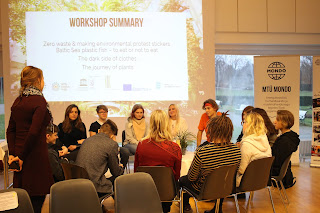From production to waste: How to make consumption fair?
What are climate policy and circular economy? Is it possible to achieve zero waste production and consumption? What are the main sustainable challenges present today in Estonia? How to create fairness with trade? Above all, who is responsible for answering the above-mentioned questions?
The seminar was opened by Urve Sinijärv from Tallinn Botanic Garden, followed by the UNESCO ASP Network coordinator, Viktoria Rudenko, and the Baltic Sea Project’s coordinator, Gedy Matisen, who presented their current projects and invited students to join their activities (international web quizz, camps and Estonian Model United Nations international event in April 2020).
Additionally, Kristi Klaas, the vice-chancellor of the Ministry of the Environment held an informative presentation and emphasized the importance of youth. She said that awareness of environmental problems among people and politicians has been vastly increased in recent years. Climate policy is one of the priorities of the government and young voices are heard, since they are part of the solution. There is a Youth Council where your concerns can be expressed and debated.
During a panel discussion moderated by Liisa Salekšina, pressing climate change problems were tackled, and guests Peep Mardiste, Kristina Mänd, Ann Runnel and Rainer Pesti were intrigued to debate over them. Whole audience was greatly interested and attentive, while some students raised critical questions concerning whose responsibility is to make decisions and take action.
Later on, students had the opportunity to participate in various workshops. They learned about Zero waste lifestyles and made environmental protest stickers with Maryliis Teinfeldt. They discussed Baltic Sea problems with Gedy Matisen, and Liisa Salekšina lectured about the dark side of the clothing industry. Furthermore, there was an exciting game around the Botanic Garden, created by Viktoria Rudenko and Mari Jõgiste named “The journey of plants” where participants learned the importance of fair trade.

At the end of the day, during the workshop summary it was concluded that every action matters, everyone counts and responsibility for sustainability should be taken over by all of us. Simply said - stay informed, be aware and be less lazy.
Article written by Jelisaveta Dzigurski, a Serbian volunteer in Tartu Nature House within European Solidarity Corps programme 2019/2020








Comments
Post a Comment